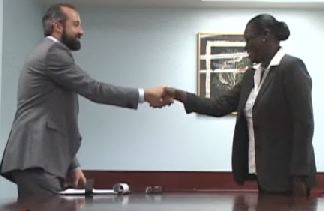 Can you remember how it feels when someone tells you how wonderful you are, or when you receive an unexpected thank-you gift in the mail? You felt really happy, right? But, how can we sustain those feelings of happiness longer and more consistently on our own?
Can you remember how it feels when someone tells you how wonderful you are, or when you receive an unexpected thank-you gift in the mail? You felt really happy, right? But, how can we sustain those feelings of happiness longer and more consistently on our own?
One author says we can actually generate those feelings more abundantly when we give them away. Judith Umlas studies why it is important to give positive acknowledgment to our fellow human beings. With Thanksgiving coming up this week in the US, Americans will be given ample opportunities to prove this theory and see if they can keep up their own happiness while boosting others. Check out this article by Donald Officer that first appeared in Positive Psychology News:
Gratitude must be paid forward so you can keep it
Gratitude has long been appreciated as a powerful implement in the happiness toolkit. From early on Positive Psychologists have recommended the keeping of a gratitude journal. However, as Martin Seligman and others concede, after a while just recording blessings starts to lose luster. To keep energy high, gratitude must be paid forward – expressed as open acknowledgment which takes on a vibrancy of its own.
 Judith Umlas, author of Grateful Leadership: Using the Power of Acknowledgment to Engage All Your People and Achieve Superior Results, has forged a successful, rewarding career out of acknowledging acknowledgement. As Senior Vice President at New York based International Institute for Learning Inc., she has lived her credo for 20 odd years. I heard it in her voice when I interviewed her. This is no mere mantra: she believes deeply in the value of actual practice to both the praiser and the praised.
Judith Umlas, author of Grateful Leadership: Using the Power of Acknowledgment to Engage All Your People and Achieve Superior Results, has forged a successful, rewarding career out of acknowledging acknowledgement. As Senior Vice President at New York based International Institute for Learning Inc., she has lived her credo for 20 odd years. I heard it in her voice when I interviewed her. This is no mere mantra: she believes deeply in the value of actual practice to both the praiser and the praised.
In this book, Judy buttresses her own largely anecdotal evidence with several well known gratitude and acknowledgment studies. Her material is thoroughly documented, often in the words of her clients. She has distilled her experiences into principles that even the gratitude averse can apply, which will be helpful to consultants, managers, coaches and other professional practitioners.
Umlas has written about acknowledgement before. She published The Power of Acknowledgment in 2006. Her focus was transformed, however, while working at CBS as an executive producer well into the final weeks of her pregnancy. She began to realize how many people go without acknowledgement throughout their working careers. Even while devoting the utmost care and a high-level of personalized service, working people are routinely let-down when their dedication is ignored.
Like every important change in our lives, learning to practice acknowledgement is often difficult. Consider the ingrained culturally sanctioned habits that prompt criticism over appreciation, starting with ourselves. Gratitude is crucial to acknowledgement. But we need to embrace the habit to realize its importance. Umlas summarizes what it takes to practice acknowledgment as five Cs: consciousness, choice, courage, communication and commitment. Courage especially.
Corporate Culture or Laziness?
 Judy Umlas lists several excuses associated with a reluctance to acknowledge. Some suggest it is cheapened by overuse or looks like favoritism.
Judy Umlas lists several excuses associated with a reluctance to acknowledge. Some suggest it is cheapened by overuse or looks like favoritism.
Yet the author says simple thanks, plus recognition, plus acknowledgement constitute a three part “appreciation paradigm.” It is far more than a management tool, even though it very much contributes to the bottom line. The army, for example, has asked Judy to teach her acknowledgment approach in its program of suicide prevention.
In his forward Doug Rauch, retired Trader Joe’s president and current CEO of Conscious Capitalism Inc., expresses his belief that capitalism is changing. He observes that, “When you create a true culture of care, of gratitude, unbelievable things occur.”
Other CEOs agree. Leaders at Whole Foods Market, The Westervelt Company, General Mills and Prudential Annuities have all lent their profiles to this book. Their experiences remind us of the happiness dividend which is enabled by gratitude.
Judy Umlas is on solid scientific ground, too. She begins with citations from Martin Seligman’s landmark letter of gratitude study, and continues through Tal Ben-Shahar’s Even Happier: A Gratitude Journal for Daily Joy and Lasting Fulfillment. She cites specific studies including the 2003 Miami University study by Robert Emmons and Michael McCullough on gratitude’s effects on physical and emotional well-being.
All this research underscores the role that unambiguous, heartfelt enunciation of achievement can play in this virtuous cycle. For acknowledgement is much like mercy as Shakespeare writes in The Merchant of Venice, “…it is twice blessed; it blesseth him that gives and him that takes”.
Read the full article, with references, at Positive Psychology News – Photo Credit: Baby with sign by Amber B McNamara via Flickr-CC
Donald Officer, MA ’89 is a strategic thinking practitioner who melds problem solving and emerging research models to help clients anticipate unexpected scenarios and opportunities. In addition to coaching, facilitation, consulting and teaching, Don writes and blogs at Strategic Praxis, where he welcomes comments. He is a certified facilitator and member of the International Coach Federation and the Canadian Positive Psychology Association.



















